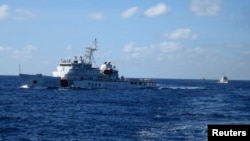With tensions mounting over maritime disputes in the South China Sea, the cause of the problem, at least in part, is believed to lie at the bottom of the water. But it is still unclear exactly how much oil and natural gas lurk beneath the surface.
Along with fishing and lucrative shipping routes, oil and gas reserves are often cited as a major reason for the disagreements over which country owns which patch of water, including China, which claims nearly all of the South China Sea.
But how much oil and gas really exist is still a question mark, according to Carl Thayer, a Professor Emeritas at Australia’s National Defense Academy.
“No one has done the really hard work scientifically. These are estimates, because there has been an interruption to oil exploration efforts in the past, the cable cutting incidents in the past, ships have been forced out of water by the Philippines that have been contested by China,” he said.
China has said that the sea holds 130 billion barrels of oil. U.S. estimates are more conservative. The U.S. Energy Information Administration says the sea likely holds just 11 billion barrels of oil, and 190 trillion cubic meters of natural gas.
Most of the oil and gas reserves are in undisputed waters, and are close to the shoreline of Malaysia, which has an estimated 5 billion barrels of oil in its waters. Vietnam is believed to have 3 billion barrels and China has 1.3 billion barrels.
“There are reserves, and there are commercial grade reserves, meaning if they can be recovered profitably, or if they can be recovered and then transported at a reasonable price to be profitable. They are unproven because they are deep in the sea, and there are a lot of technical barriers for surveillance,” said Yanmei Xie, a Beijing-based security analyst with the International Crisis Group.
But, he added, surveillance comes with real political risk, since many areas are disputed.
While territorial disputes have scared some oil companies away, China is seemingly undeterred. Beijing last month placed an oil rig in waters also claimed by Vietnam. The last time China placed a rig in disputed waters, it prompted mass, public protests in Vietnam.
While the vast resources in the sea are unproven, and so far inaccessible, the strategic value of the waterway is certain.
More than $5 trillion in goods pass through the waterway every year. Two thirds of South Korea’s energy supplies, nearly 60 per cent of Japan and Taiwan’s energy supplies and 80 percent of China’s oil imports are shipped through the South China Sea.
Wang Dong, a Professor of International Relations at Peking University, said “I think first and foremost it is a matter of territorial integrity for China, and of course China has made clear it is for the defense of the security of freedom of navigation.”
News last week that China had deployed missiles on an island in the waterway prompted criticism from several countries, including the United States. In an editorial last week China’s state-run Global Times newspaper said the missiles are "a typical type of defensive weapon", and warned that the government might deploy more weapons in the future.
The U.S. has said that it does not take sides in the territorial disputes, but says it strongly backs freedom of navigation under international law. Washington has sailed its naval vessels past islands claimed by Beijing to promote the idea that the waters should be open for safe transit for all.


